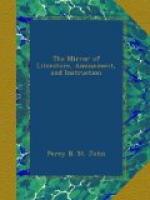In the month of March, the liberator moved against the province of Pasto, the inhabitants of which country are surpassed in bravery by no people in the world, but who adhered with blind attachment to the ancient regime. The liberator, having overcome the obstacles presented by nature in the valleys of Patia, and the formidable river Guanabamba, arrived in front of Bombona. The Pastusos (inhabitants of the province of Pasto) had here taken up a strong position, supported by the Spanish troops. They were vigorously attacked; but every charge made in front was repulsed. It was not until the rifle battalion, commanded by the able Colonel Sands, outflanked the Pastusos, that victory declared for Bolivar; but his army had suffered so severely, that, instead of immediately following up the fugitives through a hostile country, it fell back a short distance.
Whilst these operations were going on, Sucre liberated the provinces of Loja and Cuenca, and, on the 24th of May, gained the victory of Pinchincha, which gave independence to Quito. In the same year Carthagena and Cumana, surrendered to the liberating forces in Venezuela.
The liberator entered Quito on the 16th of June. His attention was soon attracted to the discontents which had arisen at Guayaquil, where the Colombians had become unpopular. His excellency proceeded to that town, and, under his auspices, the provisional government annexed the province to Colombia.
One of the results of the interview which took place between the protector of Peru and the liberator of Colombia was the sending of an auxiliary force of two thousand Colombians to Lima; but the junta, which proceeded to the protectorate, ordered the Colombian troops to return to Guayaquil. The president Riva Aguero, who succeeded to the junta, applied for an auxiliary Colombian division of six thousand men, and invited Bolivar to take the command of all the military forces in Peru. The Colombian troops were sent to Lima. General Bolivar obtained leave from the congress at Bogota to go to Peru—the grand scene of his subsequent triumphs.
The person of Bolivar is thin, and somewhat below the middle size. He dresses in good taste, and has an easy military walk. He is a very bold rider, and capable of undergoing great fatigue. His manners are good, and his address unaffected, but not very prepossessing. It is said that, in his youth, he was rather handsome. His complexion is sallow; his hair, originally very black, is now mixed with gray. His eyes are dark and penetrating, but generally downcast, or turned askance, when he speaks; his nose is well formed, his forehead high and broad, the lower part of the face is sharp; the expression of the countenance is careworn, lowering, and sometimes rather fierce. His temper, spoiled by adulation, is fiery and capricious. His opinions of men and things are variable. He is rather prone to personal abuse, but makes ample amends to




